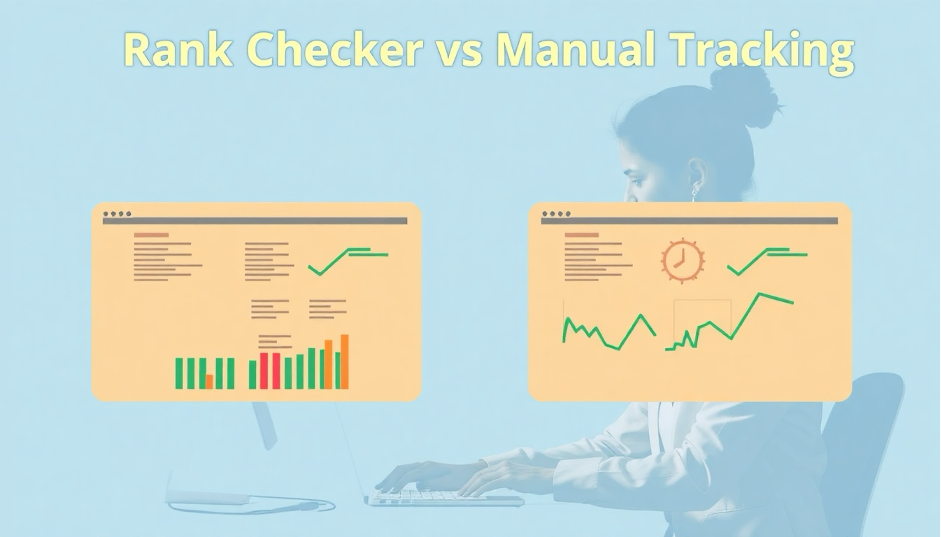Tracking keyword positions is a core element of search engine optimization. Whether you’re managing a personal blog or coordinating an enterprise-level SEO campaign, knowing where your content ranks on Google helps shape strategic decisions.
For many professionals, this process still involves checking each keyword manually and recording results in spreadsheets. While straightforward, this method can quickly become a time sink — especially when managing large keyword sets or multiple regions.
A bulk SERP rank checker provides an automated alternative. It collects ranking data for dozens or hundreds of keywords at once, saving hours of manual work and minimizing errors.
This article compares both methods in terms of time efficiency, data quality, and scalability. You’ll gain insight into which approach better supports your SEO goals and how to choose the right workflow based on your needs.
Manual SERP Tracking: Simplicity at a Cost
How It Works
Manual tracking involves entering each keyword into a search engine and recording its position. SEO professionals often store this data in spreadsheets. It’s a direct method — but not without its complications.
Why Some Still Use It
Manual checks give a raw, unfiltered view of the search results page. You see what a real user sees. For small websites targeting a limited number of queries, this can be sufficient.
However, most experts agree that this method doesn’t scale well. Even basic rank monitoring across different regions becomes a logistical challenge. According to Moz’s beginner SEO guide, search personalization, device type, and location can all skew results during manual tracking.
Drawbacks
● Time-consuming – Checking each keyword individually is inefficient.
● Inconsistent – Personalization and browser settings distort rankings.
● Error-prone – Manual input increases the risk of inaccuracies.
Over time, these flaws can compromise SEO reporting and lead to misguided decisions.
What Is a Bulk SERP Rank Checker?
A bulk rank checker automates the tracking process. Upload a list of keywords, set your region or device preferences, and get the full ranking report in seconds.
These tools are purpose-built for speed, scalability, and consistency. Most operate in the cloud and include features like historical comparisons, exportable reports, and project-level tracking.
Key Features Comparison
| Feature | Benefit |
| Multi-keyword support | Track hundreds of keywords in one scan |
| Geo-targeting | View rankings from specific locations |
| Device selection | Compare desktop vs mobile SERPs |
| Scheduled reports | Track position changes over time |
Feature Benefit
One significant advantage is the neutral environment in which these tools operate. Unlike personal browsers, bulk checkers use depersonalized searches, removing bias caused by cookies or location data.
Time Efficiency: Manual vs Bulk
In any SEO workflow, time is one of the most valuable assets. Let’s compare both methods based on a 100-keyword sample:
| Method | Time Estimate |
| Manual Tracking | 3–4 hours |
| Bulk Rank Checker | Under 5 minutes |
That’s not just a minor improvement — it’s a game-changer. According to Search Engine Journal, automation tools often reduce data collection time by over 90%.
Use Case: Agency Workflow
An SEO agency managing 10 clients and 150 keywords per client used to dedicate nearly two full workdays monthly to tracking. After switching to bulk tracking, the same job was done in under two hours.
Data Quality and Consistency
Manual tracking is vulnerable to variables like user history, browser extensions, and search location. This leads to inconsistencies in reporting over time.
Bulk SERP checkers, on the other hand, use:
● Standardized IPs
● Clean, cookie-free sessions
● Device and location targeting controls
As a result, they offer data integrity that manual methods simply can’t match. Clean data equals clearer strategy.
Scaling Operations with Automation
For growing teams or expanding SEO campaigns, manual methods quickly become a bottleneck.
Bulk tools make scaling simple. Teams can assign keyword sets, schedule checks, and generate reports automatically. Reports can be shared across departments or integrated into broader analytics systems.
They also support collaboration. Cloud-based dashboards allow for simultaneous logins, user roles, and audit trails — something that spreadsheets can’t offer.
Cost: A Closer Look
It’s easy to assume manual tracking is free. But that ignores the hidden costs: human time, lost opportunities, and strategic delays.
Bulk tools usually follow a SaaS model. While that involves a subscription, the long-term efficiency gains often outweigh the cost. Especially when teams can refocus their energy on high-impact work like content creation or technical audits.
Which Should You Choose?
There’s no one-size-fits-all answer. Your choice depends on your project size, resources, and time constraints.

Choose Manual If:
● You manage a personal blog or a small site
● You check fewer than 10 keywords occasionally
● Budget is tight, and time isn’t urgent
Choose Bulk SERP Rank Checker If:
● You’re tracking dozens to hundreds of keywords
● Your team needs consistent, sharable data
● You want to save hours each week
Automation isn’t just faster — it’s more strategic. For growing businesses, it becomes essential.
Conclusion
Tracking keyword rankings is essential for any SEO strategy—but the method you choose can significantly affect your results.
Manual tracking may work for simple, low-scale tasks. However, as campaigns grow in size and complexity, this approach quickly becomes inefficient and unreliable. Automated rank checkers offer a faster, more consistent alternative, helping teams focus on analysis rather than routine collection.
Before choosing a method, consider your project’s scope, resources, and reporting needs. Use this quick checklist to guide your decision:
● ✅ You track more than 20–30 keywords regularly
● ✅ You manage multiple regions, devices, or clients
● ✅ You need consistent data for reporting and trends
● ✅ You want to reduce manual workload
● ✅ You value accuracy over anecdotal results
If you checked most of these boxes, automation is likely the better choice for your workflow.
FAQs
What is a bulk SERP rank checker?
It’s a tool that tracks keyword positions across search engines in bulk, saving time and improving accuracy.
How does manual tracking differ from automation?
Manual tracking is slower and prone to bias. Automation offers neutral, fast, and scalable reporting.
Can I use bulk tracking for local SEO?
Yes. Many tools support geo-specific tracking by city, ZIP code, or even GPS coordinates.
Is bulk rank tracking worth the cost?
Yes. It significantly reduces time spent and improves data quality for strategic SEO planning.
Lynn Martelli is an editor at Readability. She received her MFA in Creative Writing from Antioch University and has worked as an editor for over 10 years. Lynn has edited a wide variety of books, including fiction, non-fiction, memoirs, and more. In her free time, Lynn enjoys reading, writing, and spending time with her family and friends.














